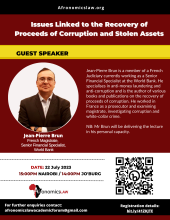Symposium on IFFs: Illicit Financial Flows & FACTI Recommendations: Reforming International Asset Recovery Mechanism
The International Asset Recovery Mechanism as it currently operates is highly unfair and disadvantageous to developing African countries. It is a system frost with power game, colonial vestige, and the undermining of the African sustainable development agenda. Indeed, African countries persistently suffer from the detrimental impact of outward illicit financial flows (IFFs), stemming from complex and multifaceted criminal and commercial activities. Latest IFFs estimates from the United Nations Conference on Trade and Development Organization for Economic Cooperation and Development and African Development Bank (AfDB) reveal an ugly illicit financial flight that continues to deprive the continent of huge domestic resources and economic prosperity.
